Key Takeaways of How to Find an Internship in the Philippines
- Explore the internship landscape in the Philippines: Gain insights into the types of internships available, industries thriving in the country, and legal requirements to navigate the internship landscape effectively.
- Utilize research and networking to identify internship opportunities: Leverage online job portals, professional networks, university career centers, and internship programs to discover and apply for relevant internship positions in the Philippines.
- Maximize your internship experience: Set goals, seek feedback, take initiative, build a professional network, and access valuable resources and support systems to make the most of your internship in the Philippines and enhance your future career prospects.
Are you a young professional eager to kick-start your career and gain valuable hands-on experience in the dynamic landscape of the Philippines?
Are you looking for an opportunity to apply your skills, learn from industry experts, and make meaningful connections in your field of interest?
If so, you’re in the right place.
This comprehensive guide is designed to be your roadmap to finding the perfect internship in the Philippines.
Internships have become an integral part of the career journey, allowing individuals to bridge the gap between theoretical knowledge and practical application.
These immersive experiences provide a unique opportunity to develop industry-specific skills, gain insights into professional workflows, and explore various career paths.
In the vibrant and fast-growing economy of the Philippines, internships offer an invaluable platform for personal and professional growth.
Before proceeding, read our popular article on the top 6 Reasons Why Internships Are Important.

However, embarking on the internship search can feel like navigating uncharted territory, especially in a country with diverse industries and a multitude of opportunities.
That’s where this guide comes in.
Whether you’re a student seeking an internship to fulfill academic requirements or a recent graduate looking to gain real-world experience, we’ve got you covered.
In the following sections, we will delve into the intricacies of the internship landscape in the Philippines and equip you with the knowledge and tools needed to navigate this competitive job market.
From conducting research and identifying suitable internship opportunities to crafting an impressive resume and acing interviews, we’ll walk you through every step of the process.
To begin your internship journey, it’s crucial to understand the unique characteristics of the internship market in the Philippines.
We’ll explore the different types of internships available across various industries and shed light on the sectors that offer the most promising opportunities.
By gaining insights into the internship landscape, you’ll be able to make informed decisions and align your aspirations with the right organizations and roles.
Once you have a clear understanding of the internship landscape, we’ll dive into the nitty-gritty of conducting research and identifying internship opportunities.
We’ll unveil a treasure trove of online job portals and websites specifically tailored to internships in the Philippines.
Additionally, we’ll share tips on leveraging your professional networks, researching internship programs offered by universities and companies, and utilizing the power of social media platforms to maximize your chances of finding the ideal internship.
Crafting an impressive resume and cover letter is paramount when vying for competitive internship positions.
In this guide, we’ll provide you with essential tips and strategies for tailoring your resume to specific internship opportunities in the Philippines.
We’ll also delve into the art of writing a compelling cover letter that captures the attention of employers and showcases your passion and suitability for the role.
With your well-crafted application materials in hand, it’s time to prepare for the interview and selection process.
We’ll equip you with valuable insights into common interview questions and guide you on how to answer them effectively.
Moreover, we’ll share tips for presenting yourself professionally and confidently during interviews, ensuring that you leave a lasting impression on potential employers.
Lastly, we’ll discuss post-interview etiquette and the importance of follow-up actions.
But securing an internship is just the beginning of your journey.
We’ll delve into the strategies for making the most of your internship experience in the Philippines.
We’ll discuss setting meaningful goals, building strong relationships with mentors and colleagues, and leveraging networking opportunities for future career prospects.
Additionally, we’ll highlight the significance of demonstrating a strong work ethic, seeking additional responsibilities, and showcasing your value throughout your internship tenure.
To support your internship journey, we’ll also provide a comprehensive list of resources and support available for interns in the Philippines.
From government programs and initiatives to professional organizations and communities, you’ll discover a wealth of avenues to enhance your learning, expand your network, and propel your career forward.
We’ll also highlight online platforms and forums where interns collaborate and share advice, fostering a sense of community and empowerment.
This comprehensive guide aims to empower aspiring interns like you to navigate the internship landscape in the Philippines with confidence and purpose.
By following the step-by-step instructions, leveraging the provided resources, and implementing the strategies outlined, you’ll be well on your way to finding the perfect internship opportunity that aligns with your goals and aspirations. So, let’s embark on this exciting journey together and unlock the doors to your future career success in the dynamic and diverse world of internships in the Philippines.
Before we venture further into this article, we like to share who we are and what we do.
About 9cv9
9cv9 is a business tech startup based in Singapore and the Philippines, with a strong presence all over the world.
With over six years of startup and business experience, and being highly involved in connecting with thousands of companies and startups, the 9cv9 team has listed some important learning points in this overview of the guide of how to find an internship in the Philippines.
If you are looking for a job or an internship, click over to use the 9cv9 Job Portal to find your next top job and internship now.
How to Find an Internship in the Philippines: A Comprehensive Guide (2023)
- Understanding the Internship Landscape in the Philippines
- Conducting Research and Identifying Internship Opportunities
- Crafting an Impressive Resume and Cover Letter
- Nailing the Interview and Selection Process
- Making the Most of Your Internship Experience
- Resources and Support for Interns in the Philippines
1. Understanding the Internship Landscape in the Philippines
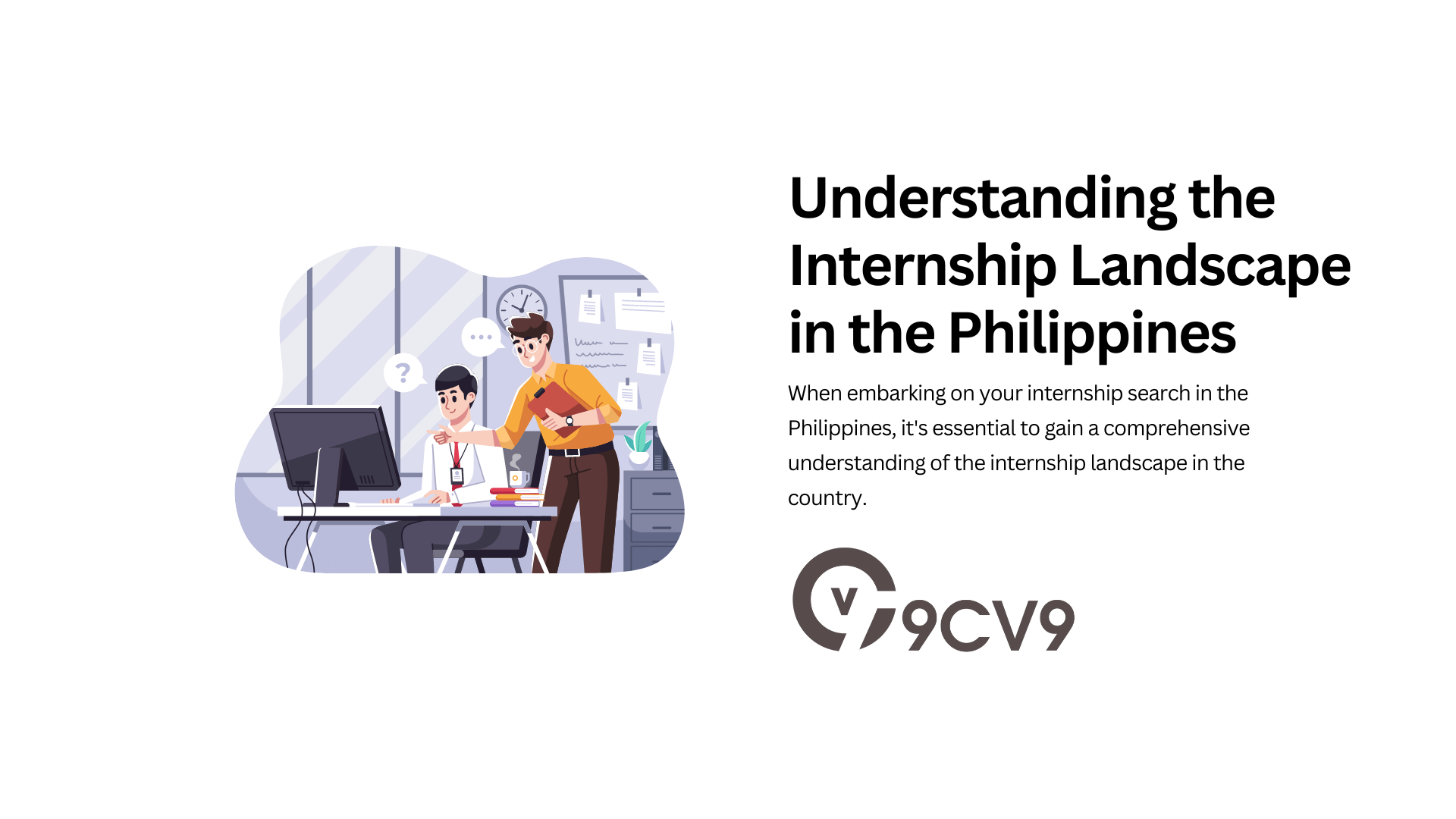
When embarking on your internship search in the Philippines, it’s essential to gain a comprehensive understanding of the internship landscape in the country.
The Philippines boasts a vibrant and diverse economy with a wide range of industries offering internship opportunities.
Let’s explore some of the key aspects of the internship landscape and discover the sectors that hold the most promise for aspiring interns.
Information Technology and Business Process Outsourcing (IT-BPO)
The IT-BPO industry in the Philippines has been experiencing rapid growth over the years, making it a hotbed for internships in various domains.
Major cities like Manila, Cebu, and Davao are home to numerous multinational companies and local firms that provide internship programs in areas such as software development, data analytics, digital marketing, and customer service.

For example, companies like Accenture, IBM, and Convergys offer internships to students and graduates interested in honing their skills in IT and business processes.
Hospitality and Tourism
As a popular tourist destination, the Philippines offers exciting internship opportunities in the hospitality and tourism sector.
Hotels, resorts, travel agencies, and event management companies often provide internships in roles such as front desk operations, guest services, event planning, and marketing.
Examples of renowned hotel chains that offer internships include Shangri-La Hotels and Resorts, Hilton Hotels and Resorts, and Marriott International.
Banking and Finance
The banking and finance sector is a vital component of the Philippine economy, offering internships to students pursuing degrees in finance, accounting, economics, and related fields.
Banks, investment firms, and financial institutions provide internship programs that expose interns to various functions, including financial analysis, risk management, and client services.
Notable players in the industry, such as BDO Unibank, Bank of the Philippine Islands (BPI), and Metrobank, often offer internship opportunities to talented individuals.
Media and Communications
With the rise of digital media and content creation, the media and communications industry in the Philippines has seen significant growth.
Internships in this field can encompass areas like journalism, public relations, advertising, and social media management.
Companies like ABS-CBN Corporation, GMA Network, and advertising agencies like Ogilvy and MullenLowe offer internships that provide hands-on experience in media production, content development, and strategic communications.
Engineering and Construction
As the country continues to invest in infrastructure development, the engineering and construction industry presents numerous internship opportunities.
Engineering firms, construction companies, and government agencies offer internships in civil engineering, electrical engineering, mechanical engineering, and related disciplines.
Examples include companies like Aboitiz Construction Group, Megawide Construction Corporation, and the Department of Public Works and Highways (DPWH).
Non-profit and Social Organizations
Interning with non-profit organizations and social enterprises in the Philippines can provide valuable insights into social development and community empowerment.
These organizations focus on areas such as education, healthcare, environmental conservation, and poverty alleviation.
Some prominent examples include the Philippine Red Cross, Gawad Kalinga, and Teach for the Philippines. Internships in these sectors often offer opportunities to make a positive impact while gaining practical experience.
Creative Industries
The Philippines has a vibrant creative industry that encompasses fields like design, advertising, film and television production, animation, and graphic arts.
Interning with creative agencies, production studios, or media companies can provide hands-on experience and foster creativity.
Examples of companies offering internships in the creative sector include TBWA\Santiago Mangada Puno, ABS-CBN Film Productions (Star Cinema), and Black Sheep Productions.
These examples represent just a snapshot of the internship opportunities available in the Philippines.
Also, 9cv9 Recruitment and Headhunting Agency is always hiring. Register a free profile at 9cv9.com to kickstart your job application process.
It’s important to note that internships can also be found in fields like healthcare, education, research, government, and more.
By researching and exploring industries aligned with your interests and career goals, you can identify the sectors that resonate with you and offer the most promising internship experiences.
In the next section, we’ll delve into the methods of conducting research and identifying internship opportunities in the Philippines, equipping you with the tools to navigate this competitive job market effectively.
2. Conducting Research and Identifying Internship Opportunities
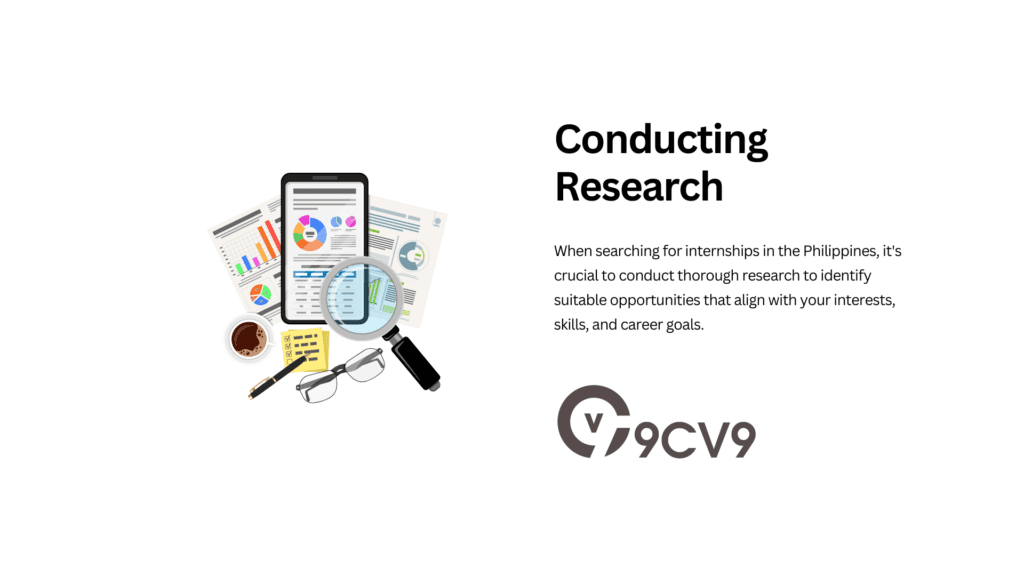
When searching for internships in the Philippines, it’s crucial to conduct thorough research to identify suitable opportunities that align with your interests, skills, and career goals.
By utilizing various resources and strategies, you can uncover a wide range of internship programs across different industries.
Let’s explore the methods and platforms you can leverage to conduct effective research and discover exciting internship opportunities.
Online Job Portals and Websites
One of the most accessible and convenient ways to find internships is through online job portals and websites dedicated to internship listings.
These platforms aggregate internship opportunities from different companies and organizations, making it easier for you to browse and apply.
Some popular job portals in the Philippines include:
- 9cv9
- JobStreet
- Indeed Philippines
- Internmatch Philippines
These websites allow you to search for internships by location, industry, and specific keywords.
For the top 10 free job websites to register and find a job, look no further than our top guide on “10 Free Job Posting Sites in the Philippines”.
Make sure to create an updated profile and upload a well-crafted resume to increase your visibility to potential employers.
University Career Centers and Job Boards
Many universities in the Philippines have dedicated career centers or job boards that advertise internship opportunities exclusively for their students and alumni.
These resources are often valuable, as they cater to local internships and have established connections with companies and organizations in the area.
Reach out to your university’s career center or explore their website to discover internship postings tailored to your field of study.
Professional Networks and Connections
Networking plays a vital role in finding internship opportunities.
Leverage your professional networks, including professors, alumni, mentors, and industry contacts, to inquire about potential internships.
Attend career fairs, industry events, and conferences where you can meet professionals in your desired field.
Join relevant professional organizations and online communities to expand your network and gain insights into available internships.
Networking can often uncover hidden internship opportunities that may not be publicly advertised.
Company Websites and Career Pages
Directly visiting the websites of companies and organizations that interest you can yield fruitful results.
Many companies have dedicated career pages where they advertise internship programs and job openings.
Explore the websites of industry-leading companies in your desired field and look for their “Careers” or “Jobs” section.
Some companies even have specific internship portals or application forms.
Examples of companies known to offer internships in the Philippines include:
- Ayala Corporation
- San Miguel Corporation
- Unilever Philippines
- Nestlé Philippines
- Globe Telecom
Social Media Platforms
Social media platforms can be powerful tools for finding internships.
Follow the social media accounts of companies, organizations, and job portals that frequently post internship openings.
Platforms like LinkedIn, Facebook, Twitter, and Instagram can provide real-time updates on internship opportunities and allow you to engage with employers directly.
Join industry-specific groups and communities where professionals often share internship openings and advice.
Professional Events and Workshops
Attending professional events, workshops, and seminars related to your field of interest can expose you to internship opportunities.
These events often feature guest speakers, industry leaders, and recruiters who may announce internships during their presentations or networking sessions.
Additionally, workshops and seminars can enhance your skills and knowledge, making you a more competitive candidate for internships.
Referrals and Recommendations
Don’t underestimate the power of referrals and recommendations.
Inform your friends, family, and acquaintances about your internship search and ask if they have any connections or leads.
Sometimes, internship opportunities arise through personal referrals, as companies prefer candidates who come recommended by trusted sources.
Be proactive in reaching out to your network and expressing your interest in internships.
Remember, conducting research and identifying internship opportunities require persistence and active engagement.
Avoid Scammy Companies and Companies who do not pay for internship
When searching for internship opportunities, it’s essential to be cautious and avoid scammy companies or those that do not offer payment for internships.
Scammy companies may promise attractive internships but fail to deliver on their commitments, wasting your time and effort.
Additionally, some companies may exploit interns by not providing fair compensation for their work.
It’s important to thoroughly research companies, read reviews, and seek recommendations to ensure you choose reputable organizations that value and compensate their interns appropriately.
By being vigilant and selective, you can protect yourself from potential scams and secure a valuable and rewarding internship experience.
For example, these are two companies based in the Philippines that have been reported scamming and cheating job seekers and interns.
Regularly check the platforms mentioned above, set up email alerts for new postings, and be proactive in reaching out to potential employers.
Tailor your search to specific keywords, locations, and industries to narrow down your options and increase the relevance of the opportunities you find.
3. Crafting an Impressive Resume and Cover Letter
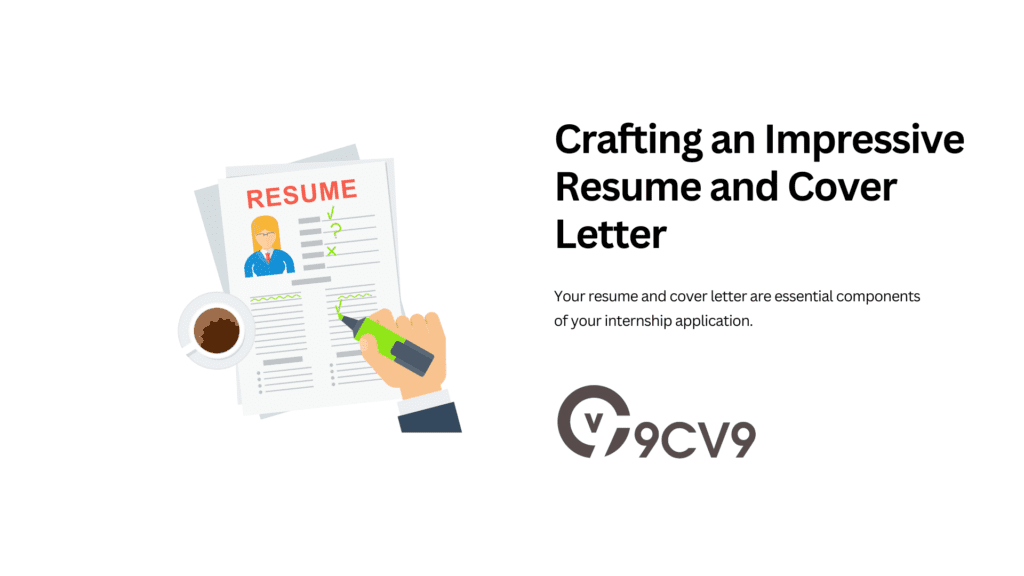
Your resume and cover letter are essential components of your internship application.
They serve as your first impression to potential employers, highlighting your qualifications, skills, and experiences.
A well-crafted resume and cover letter can significantly increase your chances of securing the internship opportunity you desire.
Let’s explore the key elements and strategies for creating an impressive resume and cover letter that will make you stand out from the competition.
Resume Structure and Format
A well-structured resume is easy to read and allows employers to quickly grasp your qualifications.
Pro tip: use a CV builder such as UrbanCV to help you construct and build a strong CV capable of applying to top companies such as Google, Meta, etc.
Here’s a recommended format for your internship resume:
a. Header: Start your resume with a header that includes your name, contact information, and professional email address.
b. Objective or Summary Statement: Write a concise objective or summary statement that highlights your career goals and relevant skills. Tailor this section to the specific internship opportunity you’re applying for.
c. Education: List your educational background, including the name of the institution, degree or program, graduation date (or expected graduation date), and any academic achievements or honors.
d. Relevant Coursework: If you’re a student or recent graduate, include a section highlighting relevant coursework that demonstrates your knowledge in the field.
e. Work Experience: Detail your work experience, including internships, part-time jobs, volunteer positions, or relevant projects. Include the company or organization name, your position, dates of employment, and a brief description of your responsibilities and accomplishments.
f. Skills: Showcase your relevant skills, including technical skills, software proficiency, languages spoken, and any certifications you’ve obtained.
g. Achievements and Awards: Highlight any notable achievements, awards, or recognition you’ve received, such as academic scholarships or leadership positions.
h. Extracurricular Activities: Include involvement in clubs, organizations, or community service that demonstrates your teamwork, leadership, or relevant skills.
i. References: Optionally, provide references or state that references are available upon request.
When crafting your resume, ensure it is visually appealing, well-organized, and error-free.
Use concise bullet points to highlight your accomplishments and quantify results whenever possible.
Tailor your resume to the specific internship opportunity by emphasizing relevant experiences and skills.
Also, read this important guide for more details on how to create an ATS-friendly resume, “ATS-Friendly Resume: What Is It and How to Make One?”
Cover Letter Content and Structure
A compelling cover letter complements your resume by expressing your enthusiasm for the internship and showcasing your unique qualifications.
Follow this structure to create an impactful cover letter:
a. Header: Include your name, contact information, and the date of writing the cover letter.
b. Salutation: Address the cover letter to the specific individual or department, if possible. Use professional salutations such as “Dear [Hiring Manager’s Name]” or “To the [Department Name] Hiring Team.”
c. Opening Paragraph: Begin with a strong opening that captures the reader’s attention. State the internship position you’re applying for and briefly explain why you’re interested in the opportunity and the company. Show enthusiasm and highlight any personal connections or experiences related to the organization.
d. Body Paragraphs: Use one or two paragraphs to highlight your relevant experiences, skills, and qualifications. Connect your experiences to the internship role and explain how your skills make you a strong fit for the position. Provide specific examples and achievements to support your claims. Use action verbs and descriptive language to demonstrate your impact and contributions in previous roles.
e. Personalization: Research the company and find specific details that align with your interests and values. Mention any recent projects, initiatives, or company values that resonate with you. This demonstrates your genuine interest and understanding of the organization.
f. Closing Paragraph: Summarize your key qualifications and reiterate your enthusiasm for the internship opportunity. Express your willingness to contribute and learn from the company. Thank the reader for considering your application and provide your contact information for further communication.
g. Formal Closing: End the cover letter with a professional closing, such as “Sincerely,” followed by your full name.
Examples and Templates
To further assist you in crafting your resume and cover letter, here are a few examples and templates that can serve as a starting point:
a. Resume Example:
[Your Name] [Contact Information]
Objective: Motivated [field of study] student seeking an internship opportunity to apply and expand knowledge in [specific area or industry]. Strong academic background, exceptional teamwork and problem-solving skills, and a passion for [relevant field].
Education:
- [Degree or Program], [University Name], [Graduation Date/Expected Graduation Date]
- Relevant coursework: [Course 1], [Course 2], [Course 3]
Work Experience:
- [Company/Organization Name], [Position], [Dates]
- Responsibilities:
- Accomplishment 1
- Accomplishment 2
- Responsibilities:
Skills:
- Technical Skills: [Skill 1], [Skill 2], [Skill 3]
- Software Proficiency: [Software 1], [Software 2], [Software 3]
- Languages: [Language 1], [Language 2]
- Certifications: [Certification 1], [Certification 2]
Achievements and Awards:
- [Achievement 1]
- [Achievement 2]
Extracurricular Activities:
- [Club/Organization 1], [Position/Involvement]
- [Club/Organization 2], [Position/Involvement]
References: Available upon request
b. Cover Letter Template:
[Your Name] [Contact Information] [Date]
[Recipient’s Name] [Recipient’s Position] [Company Name] [Company Address]
Dear [Recipient’s Name],
Opening Paragraph: Express your enthusiasm for the internship opportunity and briefly explain why you are interested in the position and the company. Make a personal connection or mention any experiences related to the organization.
Body Paragraph(s): Highlight your relevant experiences, skills, and qualifications. Connect your experiences to the internship role and demonstrate how your skills make you a strong fit. Provide specific examples and achievements to support your claims.
Personalization: Demonstrate your knowledge of the company by mentioning recent projects, initiatives, or company values that resonate with you. Show your genuine interest and understanding of the organization.
Closing Paragraph: Summarize your key qualifications and reiterate your enthusiasm for the internship opportunity. Express your willingness to contribute and learn from the company. Thank the reader for considering your application and provide your contact information for further communication.
Formal Closing: Sincerely,
[Your Full Name]
Proofreading and Customization
Before submitting your resume and cover letter, proofread them carefully to eliminate any grammatical or spelling errors. Ensure that the information is accurate and up to date.
We highly recommend using ChatGPT to proofread your submission. For more information on what is ChatGPT and how to use it, read more here.
Customize each application to match the specific internship opportunity and the company you are applying to. Avoid using generic templates or sending the same cover letter to multiple employers.
Remember, your resume and cover letter should be concise, targeted, and showcase your unique qualifications.
By investing time and effort into crafting impressive application materials, you’ll significantly increase your chances of securing the internship opportunity you desire.
In the next section, we’ll discuss strategies for preparing and acing internship interviews, helping you navigate the interview process with confidence and poise.
4. Nailing the Interview and Selection Process
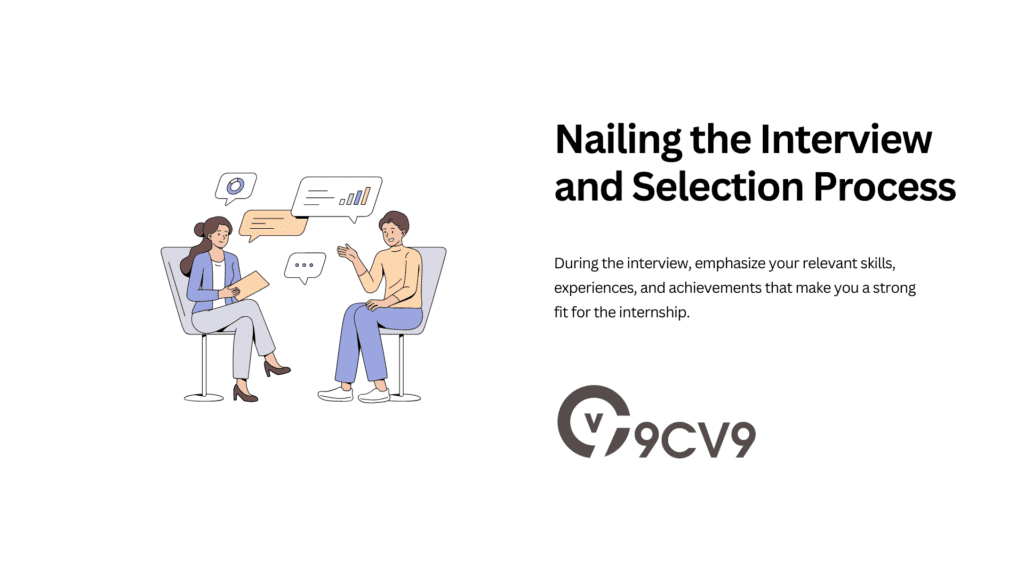
Congratulations.
You’ve made it to the interview stage of the internship selection process.
This is your opportunity to showcase your skills, personality, and enthusiasm for the internship.
To help you navigate the interview process with confidence and increase your chances of securing the internship, let’s explore some key strategies and tips for success.
Research the Company/Organization
Before the interview, thoroughly research the company or organization where you are applying for an internship.
Familiarize yourself with their mission, values, products or services, recent achievements, and any other relevant information.
This will demonstrate your genuine interest and enable you to tailor your responses to align with the company’s goals and culture.
Here are some research avenues:
- Company website: Explore the company’s About Us section, blog, news updates, and any other relevant pages.
- Social media platforms: Follow the company’s social media accounts to gain insights into their activities, culture, and recent updates.
- News articles and press releases: Look for recent news articles or press releases about the company to stay informed about their latest developments.
- LinkedIn: Visit the company’s LinkedIn page to learn more about their employees, company culture, and any connections you may have in common.
By conducting thorough research, you can demonstrate your knowledge and enthusiasm during the interview, leaving a positive impression on the interviewer.
Prepare for Common Interview Questions
While it’s impossible to predict every question you’ll be asked, preparing for common interview questions will help you feel more confident and articulate during the interview.
Consider the following examples of commonly asked interview questions and practice your responses:
a. “Tell me about yourself.”
- Highlight your relevant experiences, skills, and achievements.
- Discuss your educational background and career aspirations.
- Mention any personal qualities or characteristics that make you a strong candidate.
b. “Why are you interested in this internship/company?”
- Discuss your passion for the industry and the company’s mission.
- Reference specific aspects of the company that align with your values and interests.
- Share how the internship aligns with your career goals and how it will contribute to your professional development.
c. “Tell me about a time when you faced a challenge and how you overcame it.”
- Choose a specific example that demonstrates your problem-solving skills and resilience.
- Discuss the actions you took to address the challenge and the positive outcome you achieved.
- Highlight any lessons learned or skills developed through the experience.
d. “How do you handle working in a team?”
- Discuss your experience working in teams and highlight successful collaborations.
- Share your ability to communicate effectively, listen actively, and contribute to a positive team dynamic.
- Provide an example of a team project or accomplishment that showcases your teamwork skills.
Prepare thoughtful and concise responses to these and other potential interview questions.
Practice your answers with a friend or in front of a mirror to improve your delivery and ensure you’re addressing the core elements of each question.
Read more on our “10 Tips and Tools on How to Prepare for a Job Interview” to be ready for any interview.
Showcase Your Skills and Experiences
During the interview, emphasize your relevant skills, experiences, and achievements that make you a strong fit for the internship.
Consider the following strategies to showcase your qualifications effectively:
a. Use the STAR Method:
- Situation: Describe the specific situation or task you were faced with.
- Task: Explain the goals and objectives you were trying to achieve.
- Action: Discuss the actions you took to address the situation or complete the task.
- Result: Share the positive outcome or results that were achieved.
By using the STAR method, you can provide structured and compelling responses that demonstrate your abilities and accomplishments.
b. Share Specific Examples:
- Use specific examples from your past experiences to illustrate your skills and achievements.
- Quantify your accomplishments whenever possible. For example, instead of saying, “I improved sales,” say, “I increased sales by 20% within three months.”
c. Highlight Transferable Skills:
- Emphasize transferable skills that are relevant to the internship, even if they were developed in non-professional settings.
- For example, if you were a leader in a student organization, highlight your ability to manage projects, delegate tasks, and communicate effectively.
Remember, the goal is to demonstrate your capabilities and how they align with the internship opportunity.
Be confident, authentic, and enthusiastic about sharing your skills and experiences.
Ask Thoughtful Questions
At the end of the interview, you’ll likely be given the opportunity to ask questions.
This is an essential part of the interview process, as it shows your genuine interest in the internship and allows you to gather more information about the role and the company.
Prepare a list of thoughtful questions to ask, such as:
a. “Could you describe the typical projects or tasks I would be involved in as an intern?”
b. “How does the company support the professional development of its interns?”
c. “What are the key qualities or skills that you’re looking for in an intern?”
d. “Can you provide more insights into the team I would be working with?”
Asking thoughtful questions demonstrates your engagement and desire to learn more about the internship opportunity.
Follow-Up with a Thank-You Note
After the interview, it’s important to follow up with a thank-you note or email.
Express your gratitude for the opportunity to interview and reiterate your interest in the internship.
Personalize the message by referencing specific points discussed during the interview. This simple gesture can leave a positive and lasting impression on the interviewer.
Nailing the interview and selection process requires thorough preparation, showcasing your qualifications, and demonstrating your enthusiasm for the internship opportunity.
By researching the company, preparing for common interview questions, showcasing your skills and experiences, asking thoughtful questions, and following up with a thank-you note, you’ll greatly increase your chances of securing the internship you desire.
And, if you missed out on an interview, have no worries. 9cv9 is here to save your blushes and day with our top article on How to Recover From Missing an Important Job Interview.
5. Making the Most of Your Internship Experience
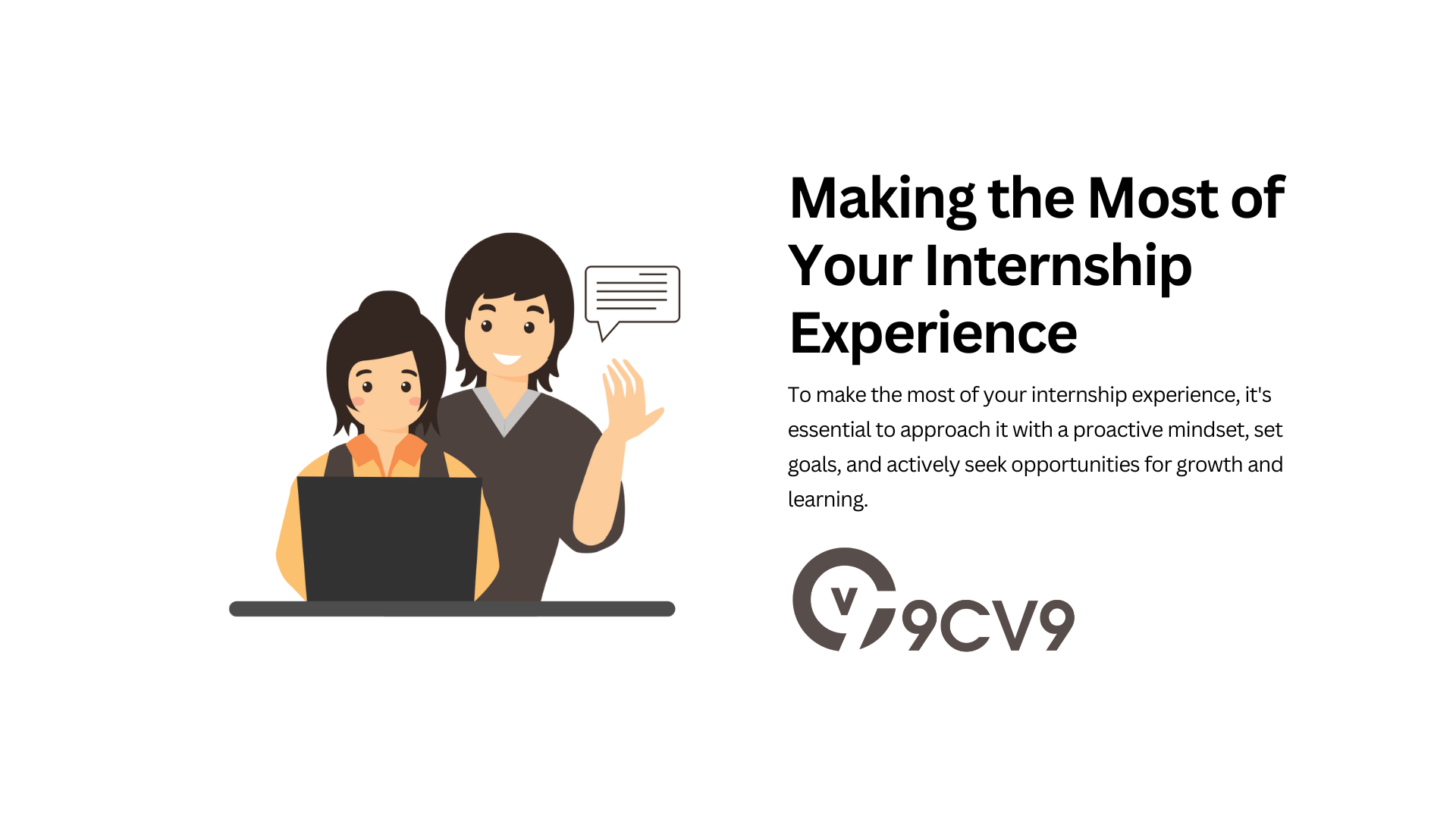
Congratulations on securing an internship in the Philippines.
This is an exciting opportunity to gain valuable skills, expand your professional network, and enhance your career prospects.
To make the most of your internship experience, it’s essential to approach it with a proactive mindset, set goals, and actively seek opportunities for growth and learning.
Let’s explore some strategies and tips to help you maximize your internship experience.
Clarify Your Goals and Expectations
Before you begin your internship, take some time to reflect on your goals and expectations.
What specific skills or knowledge do you hope to gain?
What are your career aspirations, and how does this internship align with them?
By clarifying your goals, you can focus your efforts on the areas that matter most to you and make intentional choices throughout your internship.
For example, if you’re interning at a marketing agency, your goals might include:
- Developing a strong understanding of digital marketing strategies and techniques.
- Gaining hands-on experience with social media management and analytics.
- Building professional relationships with industry experts.
Seek Feedback and Learn from Mentors
One of the most valuable aspects of an internship is the opportunity to learn from experienced professionals in your field.
Actively seek feedback from your supervisors and mentors throughout your internship.
Ask for constructive criticism and suggestions for improvement.
This feedback will help you refine your skills and enhance your performance.
Additionally, take advantage of any mentorship programs or opportunities offered by the company.
Mentors can provide guidance, share insights, and offer career advice based on their own experiences.
Building a strong relationship with a mentor can be invaluable in your professional development.
Also, read our statistics and data on Internship, which we took time to gather from all over the world.
Take Initiative and Volunteer for Projects
To make a lasting impression and gain valuable experience, don’t shy away from taking initiative and volunteering for projects.
Seek opportunities to contribute beyond your assigned tasks and show your willingness to take on additional responsibilities.
For example, if there’s a new project or task that aligns with your interests and goals, express your interest in participating.
This demonstrates your proactive attitude and eagerness to learn.
Volunteering for projects allows you to showcase your skills, expand your knowledge, and make a meaningful impact during your internship.
Network with Colleagues and Professionals
Networking is a crucial aspect of any internship experience.
Take the opportunity to connect with colleagues, professionals in your field, and other interns.
Building a strong professional network can open doors to future career opportunities and provide valuable insights and advice.
Here are some strategies for effective networking:
a. Attend company events and social gatherings: Participate in company events or social activities to meet and interact with professionals from different departments. This allows you to build relationships and expand your network within the organization.
b. Join professional organizations and attend industry events: Join industry-specific professional organizations and attend conferences, seminars, and networking events. These events provide opportunities to meet professionals from various companies and learn about the latest trends in your field.
c. Utilize LinkedIn: Create a strong LinkedIn profile and connect with professionals you meet during your internship. Engage with their content, join relevant LinkedIn groups, and reach out for informational interviews or mentorship opportunities.
Remember, effective networking goes beyond collecting business cards or LinkedIn connections.
It involves building genuine relationships based on mutual respect and shared interests.
Document Your Accomplishments and Reflect on Your Growth
Throughout your internship, keep a record of your accomplishments, new skills acquired, and projects you’ve worked on.
This documentation will serve as a valuable resource when updating your resume or discussing your internship experience in future job interviews.
Additionally, take the time to reflect on your growth and progress during your internship.
Ask yourself:
- What new skills have I developed?
- How have I grown professionally and personally?
- What challenges have I overcome?
- What successes have I achieved?
Reflecting on your internship experience allows you to gain insights into your strengths and areas for improvement.
It also helps you articulate your accomplishments and the value you can bring to future employers.
Ask for a Letter of Recommendation
Towards the end of your internship, if you’ve built a strong rapport with your supervisors and mentors, consider asking for a letter of recommendation.
A well-written recommendation letter from a respected professional can greatly enhance your future job prospects.
When requesting a letter of recommendation, provide your recommender with specific information about your accomplishments, skills, and contributions during the internship.
This will enable them to write a personalized and impactful letter that highlights your strengths.
Reflect on Your Overall Experience and Lessons Learned
As your internship comes to a close, take the time to reflect on your overall experience and the lessons you’ve learned.
Consider the following questions:
- How has this internship impacted your career goals and aspirations?
- What specific skills and knowledge have you gained?
- What challenges have you encountered, and how have you overcome them?
- What aspects of the internship have you enjoyed the most, and why?
By reflecting on your internship experience, you can gain valuable insights that will shape your future career choices and help you make informed decisions.
Making the most of your internship experience requires a proactive approach, goal setting, seeking feedback, networking, and reflecting on your growth.
By actively engaging with your internship, seizing opportunities, and building meaningful relationships, you’ll leave with valuable skills, a strong network, and a deeper understanding of your chosen field.
6. Resources and Support for Interns in the Philippines
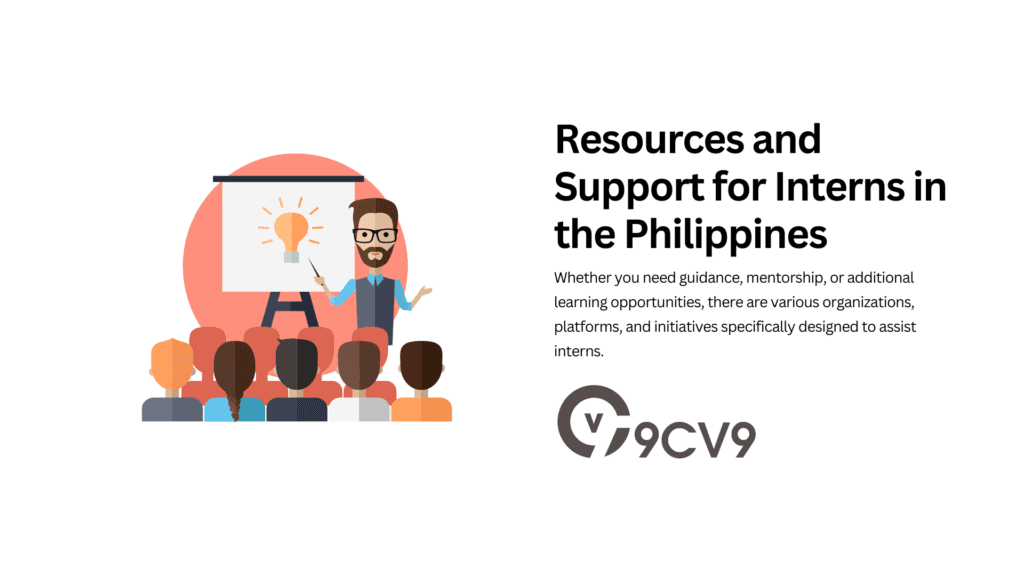
As an intern in the Philippines, it’s important to take advantage of the resources and support available to enhance your internship experience and ensure your professional growth.
Whether you need guidance, mentorship, or additional learning opportunities, there are various organizations, platforms, and initiatives specifically designed to assist interns.
Let’s explore some of the valuable resources and support systems you can access during your internship.
Internship Programs and Platforms
a. AIESEC Philippines: AIESEC is a global youth-led organization that offers internships and volunteer opportunities. They connect young talents with local and international companies, providing valuable experiences in various fields.
b. 9cv9: 9cv9 is one of the top internship portals for aspiring interns to find the best and high-salaried internships in the Philippines. Register now for free at 9cv9.com.
c. JobStreet.com: JobStreet is a popular job portal in the Philippines that also offers internship listings. You can search for internships based on location, industry, and duration, making it a useful resource to find suitable opportunities.
Professional Development and Learning
a. Technical Education and Skills Development Authority (TESDA): TESDA offers various technical vocational courses and programs to enhance your skills and qualifications. These courses cover a wide range of industries, providing practical training and certification that can boost your employability.
b. Online Learning Platforms: Platforms like Coursera, Udemy, and LinkedIn Learning offer a wide range of online courses that can supplement your internship experience. These platforms provide opportunities to develop new skills, gain industry-specific knowledge, and showcase your commitment to continuous learning.
c. Professional Associations: Many professional associations in the Philippines provide resources and support for interns and young professionals in specific fields. For example, the Philippine Marketing Association (PMA) offers workshops, seminars, and networking events for marketing interns and professionals.
Mentorship and Networking
a. Internship Programs with Mentoring Components: Some organizations and institutions in the Philippines provide internship programs with built-in mentoring components. These programs pair interns with experienced professionals who provide guidance, support, and career advice throughout the internship period.
b. Professional Networking Events: Attend networking events, industry conferences, and seminars to connect with professionals in your field. These events offer opportunities to expand your professional network, gain insights into industry trends, and potentially find mentors who can provide guidance in your career journey.
c. LinkedIn Groups and Communities: Join relevant LinkedIn groups and communities to connect with professionals in your field of interest. Engage in discussions, ask questions, and share your experiences to build relationships and tap into the collective knowledge of industry experts.
Career Services and Job Portals
a. University Career Centers: If you’re interning while studying in a university, make use of your institution’s career center. They can provide valuable resources, such as career counseling, resume reviews, and job search support.
b. Job Portals and Recruitment Agencies: In addition to JobStreet.com, other job portals like 9cv9 and LinkedIn’s job section are worth exploring for internship opportunities. These platforms often have dedicated sections for internships, making it easier to find relevant positions.
c. Alumni Networks: Reach out to alumni from your university or college who are working in your desired field. They can provide guidance, career advice, and potential job or internship leads.
Workplace Support and Feedback
a. Supervisor and Mentor Guidance: Seek regular feedback and guidance from your supervisor and mentor. They can offer insights on your performance, suggest areas of improvement, and help you navigate any challenges you may encounter during your internship.
b. Employee Resource Groups (ERGs): Some companies have employee resource groups dedicated to supporting interns and young professionals. These groups provide opportunities for networking, professional development, and mentorship within the organization.
c. Internship Program Coordinators: If your internship is part of a structured program, reach out to the program coordinators for support and guidance. They can address any concerns or queries you may have and provide resources to enhance your experience.
Remember, utilizing these resources and support systems can significantly enhance your internship experience and set you up for success in your future career.
Take the initiative to seek guidance, expand your network, and continuously learn and grow throughout your internship journey.
Conclusion
You have reached the end of this comprehensive guide on how to find an internship in the Philippines.
(Secret tip that not everyone has to do an internship. It really depends. Understand why we say this in our article on “When Should You Not Do an Internship?“)
We have covered a wide range of topics, from understanding the internship landscape to nailing the interview process, and from making the most of your internship experience to accessing valuable resources and support systems.
By following the strategies and tips outlined in this guide, you are well-equipped to embark on a successful internship journey in the Philippines.
Internships offer a unique opportunity to gain practical experience, develop essential skills, and expand your professional network.
The Philippines, with its vibrant economy and diverse industries, provides a wealth of internship opportunities across various sectors.
Whether you are a local student looking to gain industry-specific experience or an international student seeking a cross-cultural learning experience, the Philippines has much to offer.
To recap, here are some key takeaways from this guide:
- Understand the Internship Landscape: Familiarize yourself with the types of internships available, the industries that thrive in the Philippines, and the legal requirements for internships.
- Conduct Research and Identify Opportunities: Utilize online job portals, company websites, and professional networks to search for internship opportunities. Consider reaching out to universities, professional associations, and internship programs for additional support.
- Craft an Impressive Resume and Cover Letter: Tailor your resume and cover letter to highlight relevant skills, experiences, and achievements. Customize your application materials for each internship opportunity, showcasing your fit for the specific role.
- Nail the Interview and Selection Process: Prepare thoroughly for interviews by researching the company, practicing common interview questions, and showcasing your skills and enthusiasm. Follow up with a thank-you note to leave a positive impression.
- Make the Most of Your Internship Experience: Set goals, seek feedback, take the initiative, and build a strong professional network. Reflect on your accomplishments and lessons learned, and actively pursue opportunities for growth and learning.
- Access Resources and Support: Take advantage of internship programs, online learning platforms, mentorship opportunities, professional networking events, and career services to enhance your internship experience and expand your knowledge and skills.
Remember, finding the right internship may require persistence, patience, and proactive effort.
Be open to exploring different industries and roles, and consider how each internship opportunity aligns with your long-term career goals.
As you embark on your internship journey in the Philippines, embrace the challenges, seize the opportunities, and make the most of every moment.
Each experience, whether big or small, will contribute to your personal and professional growth, shaping your future career path.
We hope this comprehensive guide has provided you with the necessary information, strategies, and resources to find and excel in your internship in the Philippines.
Best of luck in your internship search, and may your internship be a stepping stone towards a successful and fulfilling career.
If you have any further questions or need additional guidance, feel free to explore the resources mentioned in this guide or reach out to professionals, career advisors, and internship coordinators who can provide tailored support.
Good luck on your internship journey.
If you find this article useful, why not share it with your friends and also leave a nice comment below?
We, at the 9cv9 Research Team, strive to bring the latest and most meaningful data, guides, and statistics to your doorstep.
To get access to top-quality guides, click over to 9cv9 Blog.
If you are keen to find a job or internship in the Philippines, then click on 9cv9 Job Portal now.
People Also Ask
How much are interns paid in the Philippines?
The payment for interns in the Philippines varies depending on factors such as industry, company size, and duration of the internship. While some internships may be unpaid, others offer stipends or allowances to cover transportation and living expenses. It’s important to research specific companies and industries to get a better understanding of the compensation norms for interns in the Philippines.
Why is an internship important in the Philippines?
Internships are crucial in the Philippines as they provide valuable opportunities for students and young professionals to gain practical experience, apply theoretical knowledge, develop industry-specific skills, expand their professional network, and increase their employability. Internships bridge the gap between academia and the real world, preparing individuals for their future careers and contributing to the overall growth and development of the workforce in the Philippines.
What is the age limit for GIP?
The age limit for the Government Internship Program (GIP) in the Philippines varies depending on the specific guidelines set by the government agency or organization offering the program. Generally, GIP is open to students and young professionals between the ages of 18 and 30, although some agencies may have specific age requirements or exceptions. It is advisable to check with the relevant government agency or organization for the specific age eligibility criteria for the GIP.































![Writing A Good CV [6 Tips To Improve Your CV] 6 Tips To Improve Your CV](https://blog.9cv9.com/wp-content/uploads/2020/06/2020-06-02-2-100x70.png)


